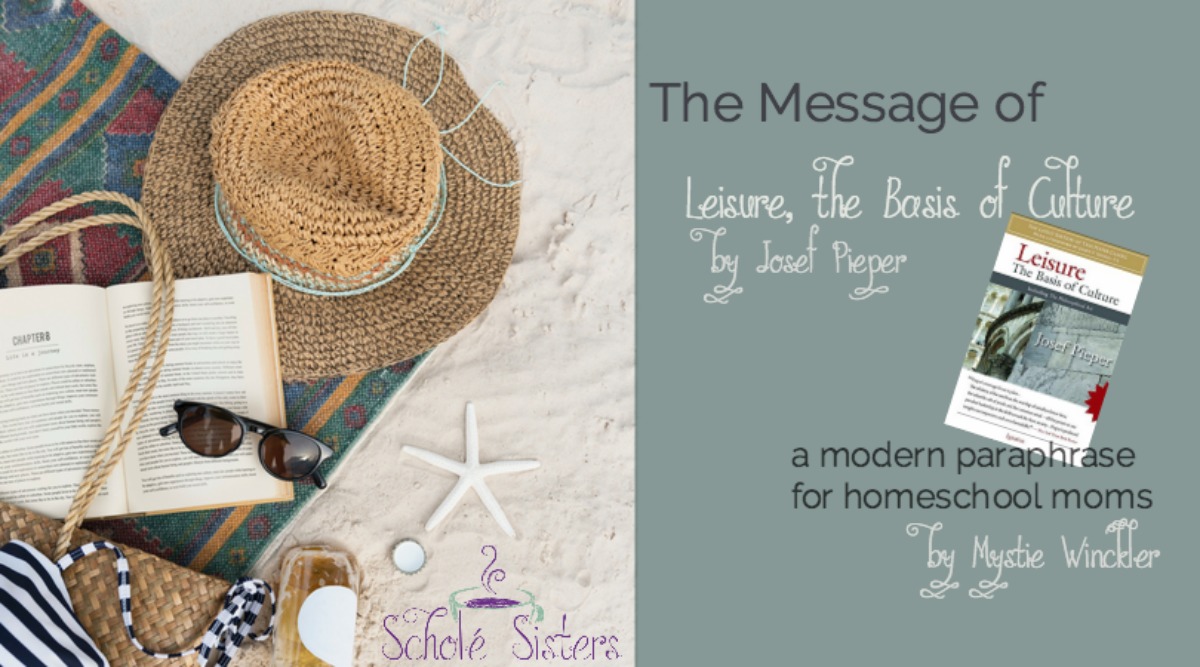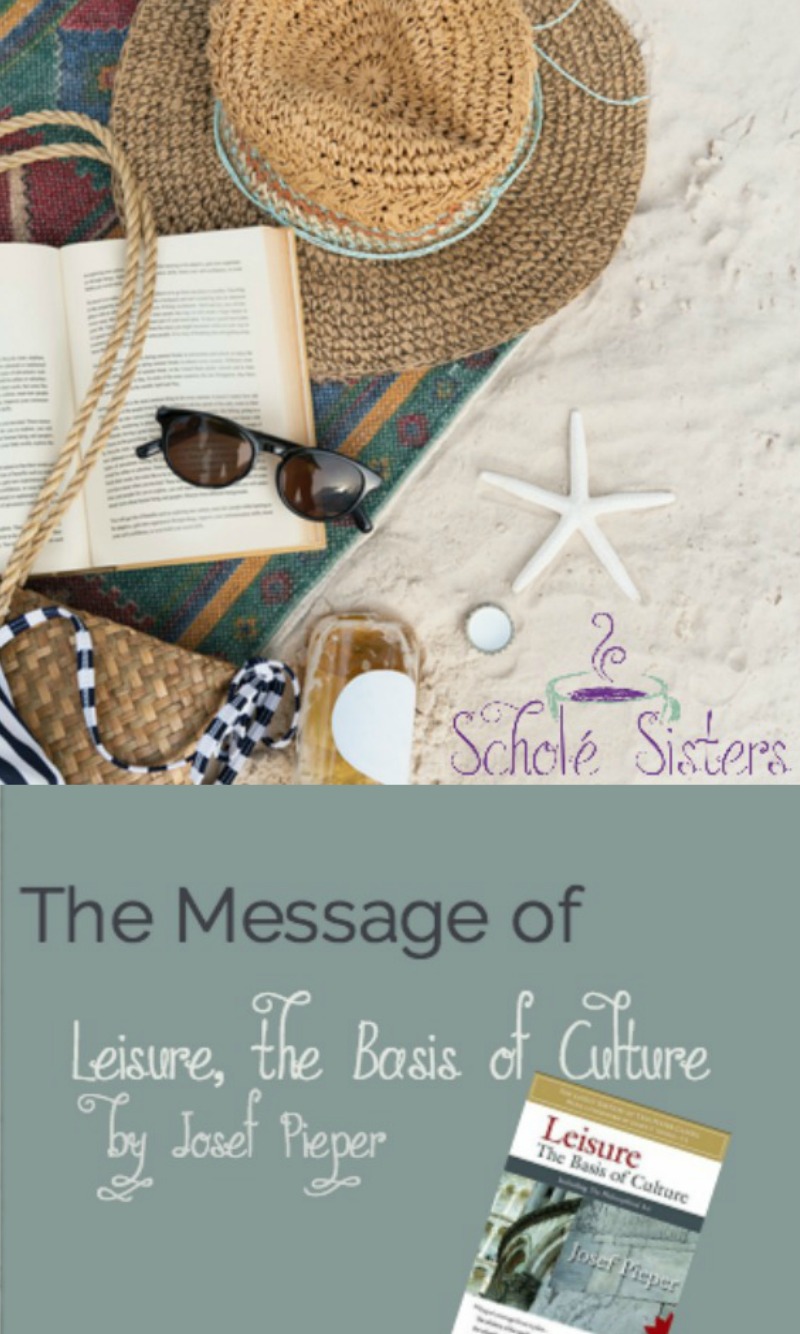The Message of Leisure & Scholé: Chapter 1 – What We’re Missing
As a summer special, Scholé Sisters is publishing a blog series through Josef Pieper’s Leisure, the Basis of Culture. This is the book that brought scholé back into our vocabulary. Instead of writing about the book or writing additional commentary, however, we’re taking a thought-by-thought paraphrase approach, chapter-by-chapter. Like The Message is to the Bible, so this series is to Leisure: common idiom, loose paraphrase, maybe a little clarification or connection added for the reader’s benefit. Enjoy!

Our hands are full. We have children to raise, meals to prepare, math pages to correct, books to read, phonograms to listen to for the zillionth time.
Of all times and of all people, why are we talking about leisure? Shouldn’t all our efforts be directed at caring for our families?
It is true: A wise woman builds her house. But building our house is so much more than meals and laundry. It’s more even than phonics lessons and reading aloud. To build our house means furnishing it with a moral and intellectual heritage.
Therefore, homeschool mom, before you have a plan for your year, you need a plan for your leisure.
When we discover our cultural heritage, Western Civilization, we will find it assumes and requires the existence of leisure.
The very history of the word speaks volumes to our own homeschool day. The Greek word for leisure is the origin of Latin scola, German Schule, English school.
The very names of our institutions of learning means “leisure.” How ironic. If anything were farther from the original concept of leisure, it’s learning in rigid, institutional centers of schooling modeled on factories, bent on efficiency, and enslaved to standardized measurements of human beings.
Americans take pride in a strong work ethic. We like to be productive. The old saying, “One does not only work in order to live, but one lives for the sake of one’s work,” might not always apply to a cubicle worker, but doesn’t it often apply to us as mothers? We live for the sake of our work, our vocation, our children-as-products. It is difficult for us to see that we have turned things upside-down.
What about this old saying: “We work in order to be at leisure.” Does that sound lazy? Hedonistic? How could society – how could a family – survive by that principle?
But this is not just any old saying. Aristotle, the sober and industrious realist, the scientist, said literally: “We are not-at-leisure in order to be-at-leisure.”
The Greeks didn’t have a different word for work, much less many words for it like we do in English. No, they called the everyday work of survival and production “not-leisure.” Not only Greek, but also Latin, stated it as something lacking.
In another place, Aristotle says that leisure is the pivot around which everything turns. The way he casually mentions it shows that he wasn’t trying to make a point, he was expressing what he and his audience believed to be evident. “Work for work’s sake” is not a concept they would have understood.
Could it be that our categories have so deviated from their source that we no longer understand what leisure actually means? Could our modern mindset prevent us from partaking in what the Greeks and Romans believed to be foundational to learning and philosophy (that is, wisdom)?
But who cares about Aristotle anyway? We can toss around quotes from Aristotle or Plato or Cicero, but do they deserve special study? Should we listen to them at all?
Guess what? The Christian ideal of the contemplative life (the vita contemplativa) was built on the Aristotelian concept of leisure. Moreover, the distinction of the “Liberal Arts” as opposed to the “Servile Arts” is made along the lines of leisure.
Are these merely facts for historians? Who today would make such distinctions? Calling anything “servile,” much less “liberal,” seems offensive.
In closer history we see the distinction pop up again. “Servile work” is the work deemed inappropriate for the Lord’s Day, the Sabbath rest, or other Holy Days (Holidays) – that is, days of leisure.
Even if most of us have lost the practice of a day of rest, still we see that such a concept – a setting aside of time for higher things – is not only ancient, but also medieval and even traditional into the modern era. Yet our understanding of the world and our relationship to it is so far removed from the ancient and medieval that we struggle with the very concept of rest and leisure – and work.
In fact, we are so enslaved by production, productivity, efficiency, and hard work, that we seem unable to recover such a thing as leisure. We see things as “not-work” instead of “not-leisure.”
Marxism has built a stronghold. Man is now a Worker. His value is in what he can contribute to the society. Even mothers justify their choice to stay home by pointing to how they contribute indirectly to the economy and society without paid occupation. We’re speaking from the worldview of our time.
Yes, man was given work in the garden, before the fall. But was man created to be primarily a Worker? No. Work was in service to something higher. Stripped of any higher meaning, all we are now left with is Work, a world of total work.
If we want to escape from this cave, we need more than a little historical research. We need to go to the very roots of a philosophical and theological understanding of what a human person is.
Next: Chapter 2, part 1 – Knowing is a spiritual activity


Thank you for doing this series. I have had Leisure The Basis of Culture on my shelf for awhile after hearing about it on your podcast. This series has given me the courage and tools to pick up this book and glean from it’s wisdom. I also appreciated the “ mother’s perspective”. It helped me see I am living “ for the sake of one’s work.”